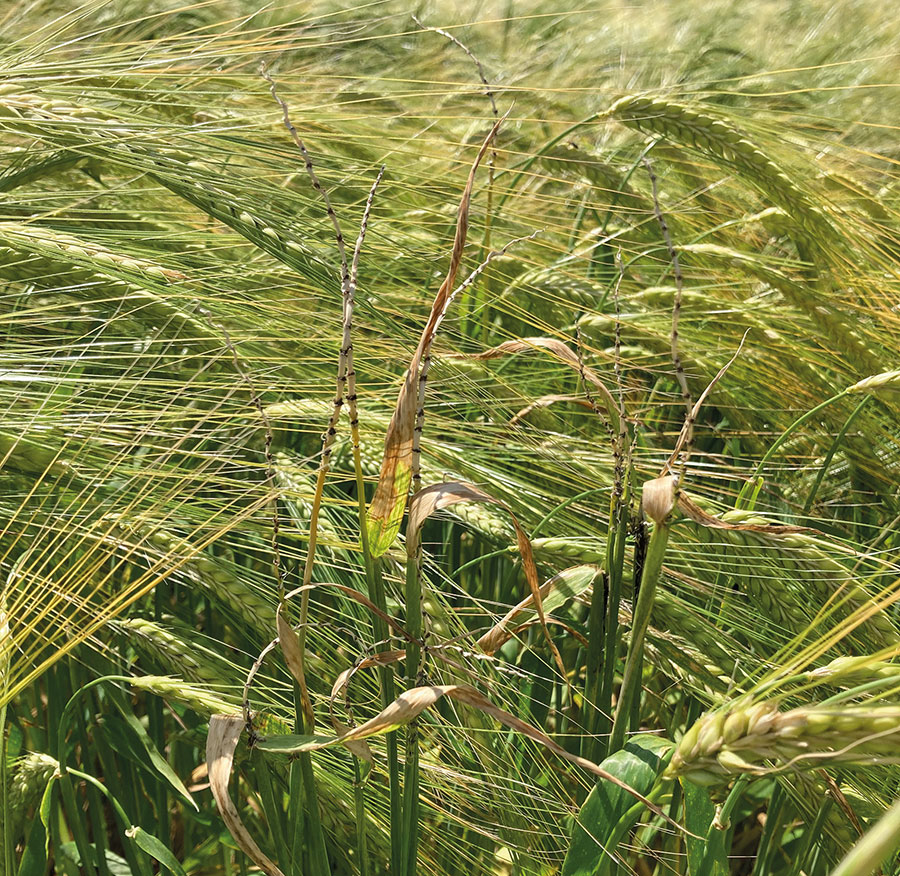Test farm-saved seed to mitigate spring barley seed-borne disease risks
25th February 2024
Growers are being urged to test and/or treat farm-saved spring crop seed for diseases such as loose smut and seed-borne net blotch.

As a result of the extreme autumn/winter weather, a larger-than-expected spring crop is being forecast. Already, most certified spring cereal crop seed has been sold with it being virtually impossible to source if you haven’t already done so, traders are saying.
That leaves farm-saved seed as almost the only possible option for growers still needing to source spring crops to drill fields that were intended for winter crops.
Those who are intending to drill grain from their own store are strongly advised to get a full germination test and indicate to the lab where glyphosate may have been applied as a desiccant. While the latter is far from ideal, any abnormal seedlings can be adjusted for by increasing the seed rate.
Where single purpose seed dressing treatments are being considered, Agrii seed technical manager David Leaper suggests that two diseases drive the choice – loose smut and seed-borne net blotch.
“Over the past five to six years, there is evidence to suggest a loss of prothioconazole sensitivity to loose smut,” he says. That, coupled with the loss of approval for some actives used for seed treatments, has led to Agrii to transition away from prothioconazole-based seed treatments to Rancona i-Mix (ipconazole + imazalil).
“There’s clear evidence to show that the level of loose smut activity you get from ipconazole is better than prothioconazole,” he says. “So that puts Rancona i-Mix as the top technical treatment for control of loose smut, which is the key priority disease in spring barley.”
The other disease of concern is seedborne net blotch. “Our trials have shown that the ipconazole/imazalil combination has the best control of seed-borne net blotch, so those two diseases are the reason for choosing Rancona i-Mix.”
Where growers are considering not treating with single purpose seed treatment, Mr Leaper recommends a seed test is used to check for disease. Around 14% of farm-saved spring barley seed was not treated with fungicidal seed treatments last spring, and those crops will be most at risk from seed-borne diseases, he says.
“You can go from trace levels or no apparent disease, with something like loose smut, to significant crop effects within three seasons, if you’re using non-treated seed without testing.”
Previous crop seed treatment choice could also be a factor to consider, even if you’re home saving last year’s bought-in certified seed, he adds.
“If your certified seed was supplied with Beret Gold (fludioxonil), which is a good treatment for seedling blights but has very little activity against loose smut, you probably want to get it tested, if you’re considering not treating.”
Nutritional seed treatments should also be considered, Mr Leaper adds. Research identified through analysis of crop samples at different growth stages that spring barley clearly required adequate manganese, zinc and copper during early stages of growth.
“These can be applied as a seed treatment as well as in a starter fertiliser, and help fill that hunger gap the crop goes through before it gets its roots down to exploit the rhizosphere.”
Spring cropping options for 2024
NAAC reiterates that many farmers are planning to plant spring sown crops in 2024, with certified spring seed being in short supply. Farm-saved seed is the best, most cost-effective option if you have suitable seed still in store, typically saving you £80–100/tonne, NAAC explains.
Trials have proven that big, high-density seed will have the best possible germination and vigour. Thorough seed cleaning removes small seed, broken grains, insect damaged grains, weed seeds, bits of straw/chaff/dust, bits of broken ears and other waste that might block your drill. This ensures that you avoid drill blockages when you are busy and minimises gaps in the rows. You can also improve your chances of getting a good establishment by selecting a combination of cost-effective seed treatments that are tailored to each field or block of land. Most soils contain high levels of fungal spores which can cause some of your seed to rot especially in cold, wet conditions. A carefully selected seed treatment will help to keep your crop free of disease during establishment. Consider using a nutritional product, for example manganese or a biostimulant to give your crop an early boost.
Your NAAC mobile seed processor can assist you in getting your spring-sown crop off to the best possible start and organise any seed testing that is required – visit www.naac.co.uk
